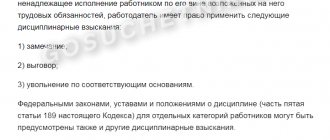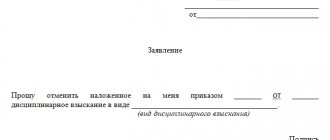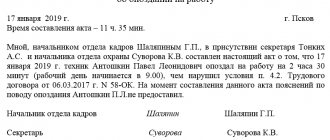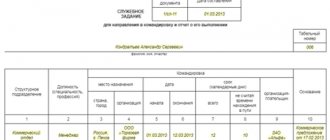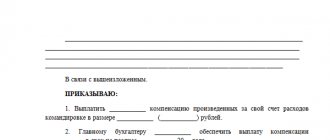Possible sanctions for dismissal
In some cases, being a couple of minutes late can have serious consequences.
Lateness is considered a minor violation, but disciplinary liability is provided for it.
At the same time, it is important to know that the Labor Code of the Russian Federation specifies only the following options for penalties: reprimand, reprimand, severe reprimand, dismissal. At the same time, the Labor Code does not allow any fines or deductions from an employee’s salary for missed minutes: any change in salary is a deviation from the terms of the contract, therefore, according to the law, it is unacceptable
However, many companies have found a way out of this situation: the majority of their salaries are bonuses, the size of which can be easily changed at the request of management. In such organizations, the most common sanction for lateness or absenteeism is deprivation of the bonus in whole or in part, for example 30 or 50%. Since it is not regulated by an agreement, the company’s management acts within the framework of the law.
Another important condition: for one offense, an employee can be punished only once. If it comes to a conflict with management, the most serious thing that awaits the employee upon the first offense is one severe reprimand entered into his personal file
There are no additional fines or other sanctions.
More serious punishment is imposed for repeated violations of labor discipline. If an employee is late several times for unexcusable reasons, he may be fired for failure to perform duties; an entry will be made in the work book that prevents further employment.
Can I be fined for being late?
Financial punishment for being late is the most effective way to teach careless workers to follow the daily routine. But the concept of “fines” is not provided for in the Labor Code of the Russian Federation. To properly punish a violator, it is necessary to take into account the following features:
- cutting the salary or rate without reducing the hours worked is not allowed;
- You can reduce part of the additional salary in the form of bonuses;
- The company must have a local Regulation allowing the amount of additional salary to be reduced. In essence, this is non-payment for hours not worked, or a fact of violation.
Thus, in order to apply this type of punishment in practice, it is necessary to correctly document the procedure with local documents. Their contents are necessarily brought to the attention of those involved.
Remember, you can “fine” it by reducing the additional salary that the employee must earn. This norm should not apply to the guaranteed amount in the form of salary (tariff rate).
An example of writing an order to issue a reprimand
Filling out the document header
At the very beginning of the document, usually on the right or left (it doesn’t matter), the name of the company is written indicating its organizational and legal status (i.e. CJSC, OJSC, Individual Entrepreneur, LLC)
Then the word “Order” is entered, its number is entered in accordance with the document flow within the company, and the date of its creation is indicated. Next, two or three words indicate the meaning of the document.
Filling out the body of the document
This is followed by the information part of the order. This includes detailed information about the violation and the reason for the penalty (in other words, the essence of the claim against the employee is described). The date of the offense, surname, patronymic name, employee and a link to the law regulating the employer’s actions in such situations must be noted here.
Further, after the word “I order”, a corresponding order is entered to issue a reprimand and a person responsible for its execution is appointed (usually this is the immediate supervisor of the offender or the head of the personnel department - here you must indicate his position, last name, first name, patronymic). Below are links to the documents that became the basis for the order (memorandum, act, explanatory note, etc.).
Signatures of interested parties
Finally, the order must be certified by the signatures of all interested officials, including the head of the company, the head of the structural department and the offending employee himself.
What disciplinary violation can be applied for being late or absenteeism?
Violation of labor regulations and discipline is not permitted. When being hired, an employee signs documents upon familiarization that establish the rules of conduct and work schedule (in any case, this is required by labor legislation, but some employers neglect this). They sign and the employee undertakes to comply with the work schedule, be at the workplace at the appointed time, and come to work on time.
If violations nevertheless occur, the manager decides how to punish the employee. The law stipulates three types of penalties, but no explanation is given as to which type of penalty should be applied for which offense. Therefore, the employer decides this issue independently on the basis of the received documentation indicating a violation of labor discipline (absenteeism or tardiness). The employee’s explanations, the circumstances of the incident, possible consequences in the form of material damage or harm to health, and the frequency of repetition of such a violation are taken into account.
In practice this is usually done.
Being late once is not punished in any way, but a verbal warning is given. Repeated tardiness may be punished with a written reprimand. Repeated, frequent tardiness may result in a reprimand.
If lateness develops into absenteeism, then you can even be fired or reprimanded for one absence.
In any case, before preparing an order to impose a disciplinary sanction for being late or absenteeism, you need to collect evidence that will confirm the employee’s guilt and be sure to listen to the offender. The degree of respectability of the reason given by the employee in his justification is determined by the manager independently.
It is impossible to punish deprivation of salary, bonus or other payment if there is no corresponding act that prescribes such fines.
Documenting the imposition of a disciplinary sanction
The fact of violation is recorded in an act - an act of absence from work.
The head of the unit writes a memo - a sample memo about absenteeism.
The employee writes an explanatory note - a sample explanatory note about being late or absenteeism.
Upon review of the above and additional documents, the manager makes a decision on possible disciplinary punishment. If the decision is positive, an order is drawn up. If a reprimand is announced and entered into the work book, then the entry is made on the basis of the order. If an employee quits, then the standard procedure for terminating the employment contract without working off is carried out at the initiative of the employer.
Legislative acts on the topic
Legislative acts are represented by the following documents:
| Art. Art. 57, 100 Labor Code of the Russian Federation | On fixing in an employment contract the work schedule of employees whose work schedule does not coincide with the general work schedule |
| Art. 209 Labor Code of the Russian Federation | Definition of a workplace |
| Letter of Rostrud dated March 11, 2009 No. 1146-TZ | On taking into account lateness without a good reason as a violation of the working hours |
| Art. 21 Labor Code of the Russian Federation | The fact that the employee is obliged to conscientiously fulfill his labor duties assigned to him by the employment contract, as well as to observe labor discipline |
| Art. 192 Labor Code of the Russian Federation | About disciplinary sanctions |
| clause 5 art. 81 Labor Code of the Russian Federation | Dismissal of an employee for repeated lateness |
| Art. 194 Labor Code of the Russian Federation | On the employer’s right to lift a disciplinary sanction from an employee earlier than one year after the violation |
| clause 33 of the Resolution of the Plenum of the Supreme Court of March 17, 2004 No. 2 | On the illegality of dismissing an employee who has not previously been punished for violations of labor discipline, or who has no outstanding disciplinary penalties. |
| Resolution of the State Statistics Committee of the Russian Federation dated January 05, 2004 No. 1 “On approval of unified forms of primary accounting documentation for recording labor and its payment” | Approval of the unified form No. T-8 for cases of dismissal of employees |
| clause 5, part 1, art. 81 Labor Code of the Russian Federation | Grounds for termination of employment relations with an employee |
What should an employee do if they are late?
You can explain being late and try to smooth the situation over.
Every employee has faced a situation where it is not possible to get to work on time. What needs to be done to reduce penalties to a minimum or avoid punishment altogether? Possible sequence of actions:
- It is highly advisable to notify your immediate superiors about the delay and explain the reasons. Even if they are disrespectful (overslept, got stuck in a traffic jam, etc.), management can be understanding and do without a reprimand. In any case, it is better to warn than to hope that no one will notice your absence.
- If the reason for being late is valid, it must be documented. If you felt unwell and went to the clinic, you will need a certificate from a doctor; if you were in an accident, you will need a certificate from the traffic police. If there was a utility accident at home, you will subsequently need to obtain a certificate from the housing office and present it at work as a supporting document.
- Write an explanatory note. This document is written at the request of management and gives the employee the opportunity to speak out and explain all the reasons for the misconduct. The explanatory note itself is not an exculpatory document; it must be accompanied by evidence of valid reasons.
What should you never do? Firstly, it is extremely undesirable to lie. If the relationship with your superiors is good, it is better to name the true reason for being late and promise not to allow this to happen again, rather than childishly invent non-existent circumstances. Secondly, it is better not to try to falsify doctor's certificates and other documents to justify oneself. This will not improve the situation, but will only worsen it, since management can easily verify the authenticity of any document if doubt arises.
If it turns out that an employee used a fake certificate, he will most likely be fired. In addition, criminal prosecution awaits the doctor or police officer who issued the forged document. In order not to complicate life for yourself and others, it is better to refuse unnecessary risks.
Order about being late
Sample memo The manager of the late employee needs to draw up a Report of Lateness and give it to several witnesses of the violation for signature. Sample Certificate of Employee Lateness An employee who arrived late is required to draw up an explanatory note explaining the reasons for the violation of discipline (if he has a document proving the existence of a valid reason for being late, he should attach it to the note). Sample explanatory note If the employee does not want to write an explanatory note, a report about this is also drawn up.
Sample Certificate of Refusal of an Employee to Write an Explanatory Note The management has the right to decide whether the reason for being late was valid or not. If the manager considers that the supporting documents justify the employee, he will be released from punishment. Otherwise, the employee must be punished.
Rules for completing an order
The order is issued in a single copy
- on a regular A4 sheet
- or on the company’s letterhead (the latter option is preferable - there is no need to additionally enter the organization’s details).
You can write it either by hand or print it on a computer. But regardless of which option is chosen, the order must be certified with a “live” autograph of the head of the organization. There is no need to put a seal on it, since it relates to the internal documentation of the enterprise and, moreover, since 2016, legal entities may not use seals and stamps at all to endorse papers.
Disciplinary measures for being late for work
These include:
- remark (issued orally as a warning about the possible strengthening of existing punishments for committing certain offenses);
- reprimand (issued in the form of an order to impose such a penalty and can be withdrawn by decision of the manager at the appropriate level);
- dismissal for appropriate reasons (applied for the most serious offenses and must be formalized in the form of an order).
This list is exhaustive and cannot be adjusted directly by the employer. That is, in accordance with the current legislation, it is impossible to impose a fine as a disciplinary sanction, since this type of enforcement action does not apply to disciplinary measures. In addition, it can only be imposed by a court by its decision for committing an administrative offense or a criminal offense.
Order to issue a reprimand for being late
If you refuse to sign a document, you need to draw up an appropriate act (you should never forget that a subordinate can challenge the employer’s actions in court or complain about him to the territorial labor inspectorate).
Information about a single reprimand is not entered into the employee’s work book, but is recorded in the order of dismissal for systematic violations, if it occurs during the period of its validity.
The order form itself, completed in accordance with all the rules, after entering into force, is transferred for storage to the archive of the enterprise, where it is kept for the period established for such documents by the legislation of the Russian Federation.
Being late for work - what are the dangers and how to deal with it?
As practice shows, most often they fall on the execution of personnel department employees. However, the head of any department or service has the right to order the imposition of punishment on an employee.
Attention In any case, the executor coordinates it with interested parties, after which he submits it to the head of the institution for signature. Labor Code of the Russian Federation in the latest edition Familiarization with the document on disciplinary action rests entirely with the performer
Important As a general rule, the period for an employee to become familiar with an order is three days. How to write a disciplinary order for being late? It is a violation of discipline if an employee is late for work.
Being late is not showing up for work at a strictly established time.
To punish a late employee, you need to draw up a disciplinary order. Its form is written.
Order of reprimand for being late for work
For such situations, various disciplinary sanctions are provided. For violation of labor discipline, such as being late, it is prohibited by law to withhold money from wages, otherwise management will incur administrative punishment.
Disciplinary measures for lateness Only disciplinary sanctions are applied to a late employee, since violation of the work schedule is a disciplinary offense. There is a rule according to which the punishment should be chosen based on an assessment of the severity of the offense.
For one offense, one punishment should follow (and it must be applied within a month, maximum 6 months, not counting the employee’s time on vacation); applying several different punishments at once against an employee who has committed only one offense is unlawful on the part of the employer.
Disciplinary action for being late for work
Nowadays, it is not uncommon for company employees to abuse labor discipline by being late for work from time to time. At the same time, late arrival to the workplace often happens for no valid reason.
Sometimes such delay can cause significant losses to the company. We will tell you how you can punish a negligent employee.
Using examples, you will see which documents should be filled out and how to avoid future disputes in court. What is lateness? The concept of working hours includes not only the start and end times of work, but also the time of breaks in work.
In this case, the working time regime (common for the organization’s employees) is fixed in the internal labor regulations, and for employees whose working time regime differs from the general rules established by a given employer - in an employment contract (Art.
Art.
How to write a disciplinary order for being late?
If the employee is unable to sign the order due to absence from work, then this period is extended. If an employee does not want to confirm familiarization with the order with a signature, a report to this effect is drawn up.
Where can I order a reprimand for failure to fulfill duties? You can download a sample order for a disciplinary sanction - a reprimand - on our specialized portal.
A sample order to reprimand an employee is available here.
We announce a reprimand or reprimand
Petrov If, after two working days, the employee still does not provide an explanation for the reasons for absence from the workplace, then an appropriate report should be drawn up (see example 5). Example 5.
Limited Liability Company Autotech AKTob refusal to give explanations about the reasons for absence from work 24.03.
2011 N 2 By me, director Sergei Alekseevich Rybakov, in the presence of the head of the garage A.I.
Features of dismissal if late
If a company employee consistently shows up late or does not show up for work and is subject to disciplinary action, management has the legal right to fire him, but is not obligated to do so. If an employee does not violate labor discipline during the year, he is recognized as a conscientious employee. The employer may also cancel the penalty earlier than one year after the violation.
As the experience of employers defending their positions in court shows, an employee should not be fired if he was really constantly late for work, but this had not been observed before, no cases of late arrival to work were recorded, and the decision to fire him was made then when the employee has no outstanding penalties for violations in the past.
If an employee was absent from the workplace for more than 4 hours, this is considered absenteeism, and management may part with such an employee, even if this was the first such violation on his part.
When filling out the T-8 form, the reason for termination of the employment relationship must be indicated, and the following entry must be made in the work book:
- “The employment contract was terminated at the initiative of the employer due to the employee’s repeated failure to fulfill his work duties without good reason.”
Clause 5 of Part 1 of Art. must be indicated as the basis for termination of cooperation. 81 Labor Code of the Russian Federation. When the employee receives the work book, he signs the personal card (where the entry about the reason for dismissal must be duplicated).
Career
If such an explanation was not taken from the employee, the order imposing punishment is considered invalid. Based on the results of checking all the information confirming that the employee committed a disciplinary act, a report on disciplinary action for committing a disciplinary offense is drawn up, which reflects the essence of the act.
And such an act can be prepared no earlier than 2 business days after the employee provides an explanatory statement regarding the commission of an action considered a disciplinary offense.
Term of punishment
A violator can be punished for being late for work only within a certain period of time. The legislator outlined several key positions related to deadlines. These should be kept in mind until the collection order is signed.
The classic period for punishment is one month from the date of violation. This period is valid in all cases if the violator of discipline was regularly at work for the entire period after the date of delay. In this case, issuing an order at the end of the month will be illegal. Calculated from the date of discovery.
When, after being late, the employee got sick, went on vacation, or went on a business trip. Here, the deadlines are extended for the entire period of absence, but cannot exceed six months. But this does not mean that the employer has an additional six months to consider the case. The violation will need to be dealt with within a month after the employee returns to work.
The fact of delay was discovered by the financial audit of the enterprise. If such a violation is associated with damage to the company, the employee can be held accountable within a period of no later than 2 years from the date of delay.
Remember, if the employer missed the deadlines described above, even if there is a violation, issuing a collection order will be unlawful.
A valid reason for being late for work
Labor law norms do not contain a list of valid reasons, and there are no criteria in the laws by which circumstances can be classified into one group or another.
There may be reasons that objectively prevent you from getting to your workplace on time, for example, a major accident on the road, a terrorist attack in the subway, a burst pipe in an apartment, or a stuck elevator. A person cannot influence any of the listed circumstances, but this can happen to anyone.
It is important to prove that this happened to you, then there will be no punishment. And if so, the order can be appealed and canceled in court
Rules for drawing up an order
As of today, there is no standard unified form for an order to issue a reprimand. Enterprises and organizations can develop its form at their own discretion and based on their own understanding of this document or use widely used templates. In any case, when creating it, you must adhere to certain standards.
In particular, this document must contain information about the employer and employee, the reason for the reprimand and links to supporting documents.
The employee in respect of whom the order is issued is obliged to familiarize himself with it and put his signature on it. If you refuse to sign a document, you need to draw up an appropriate act (you should never forget that a subordinate can challenge the employer’s actions in court or complain about him to the territorial labor inspectorate).
Information about a single reprimand is not entered into the employee’s work book, but is recorded in the order of dismissal for systematic violations, if it occurs during the period of its validity.
The order form itself, completed in accordance with all the rules, after entering into force, is transferred for storage to the archive of the enterprise, where it is kept for the period established for such documents by the legislation of the Russian Federation.
Violation of labor discipline
In order for employees to maintain discipline, the process of being late cannot be left to chance.
Each case of arriving at work later than the established time must be recorded, documented and resolved accordingly. Only in this way will employees understand the seriousness of the situation with delays. A member of the workforce being late for the start of the production process must be formalized as follows:
- An act of being late for work is drawn up. A sample of this document is given below. This act is drawn up by the immediate supervisor of the violator, and it is signed by those present at the fact of the violation of discipline. Certificate of being late for work sample
- The late employee must write an explanatory note containing information about the reason for the violation. If an employee avoids a written explanation of the reason for being late, a report on this matter is also drawn up, but with a different content.
- An explanatory note for being late for work can be supplemented with a supporting document, if available. Evidence confirming the presence of a valid reason for an employee’s delay may be a certificate from the housing office about the accident, a sick leave certificate, a certificate from the traffic police, any certified medical document (certificate, referral, conclusion), a photograph of the reason for the delay, a transport ticket with a note about the flight delay, a summons and so on.
- The head of the enterprise, in the process of familiarizing himself with the supporting documents, makes a decision on the further fate of the offender. If the boss decides that the reason for being late was valid, then the employee’s life will proceed as usual until the next violation. If the presented excuses do not satisfy the management, then punishment will be applied to the violator.
- The employer issues an order regarding the unscrupulous employee being late for work and the penalty for this violation. Within three days, this document must be provided to the employee for review and signature. If the employee categorically refuses to familiarize himself with the document, a corresponding act signed by witnesses is also drawn up. Order about being late for work sample
Showing up at the workplace later than the established time is a disciplinary offense, and, accordingly, punishment for being late to work can only be disciplinary. Can you be fired for being late? Quite, but the punishment must correspond to the gravity of the offense. These measures include:
- Giving the offending employee a reprimand. This measure is considered the easiest and is applied for the first violation.
- Reprimanding the offender. This type of penalty is applied when an employee is repeatedly late for work.
- Dismissal of an employee from the company's staff. An extreme disciplinary measure is applied when an employee is regularly, unreasonably, long late for the start of the production process. Employees who are frivolous about their work schedule should know that gross violations, including being late, can result in dismissal. The employer makes the decision to dismiss an employee personally. He has such a right, but not an obligation.
We suggest you familiarize yourself with Much Furniture Contacts, Reviews, Complain - Worse.net, page 21
We suggest you familiarize yourself with: Damage to gift certificates due to wear and tear The law establishes that only one penalty is applied for one violation. It is prohibited to apply different types of punishment for one violation.
Disciplinary action must be applied to the violator within a month, but no later than six months. This period does not include the time the employee is absent from the workplace due to illness, vacation or other reasons.
If during the year the employee has no other cases of violation, then the defamatory fact is deleted from any records. The employee is considered to have no penalties at all.
Despite the seriousness of the offense, the head of the enterprise does not have the right to collect a fine for violation of labor discipline, including for being late. This provision is regulated by the Labor Code of the Russian Federation. Withholding funds violates the employment contract and the rights of the employee. For applying this penalty, the head of the organization may face administrative punishment.
If every case of lateness for work by members of the work collective is recorded, investigated, suppressed and punished, then there will be no problems with the observance of labor discipline in this organization. Drawing up various kinds of documents and acts is necessary if a conflict between the parties is submitted for trial to the labor inspectorate or court.
When hiring an employee, the director must familiarize him with the PVTR against his signature. By signing the document, a person undertakes to follow the specified requirements and comply with the rules of labor discipline. In case of neglect of the rules, the employee is responsible for the offenses committed. And the employer has every right to take disciplinary action against him.
According to Art. 21 of the Labor Code of the Russian Federation, the employee is obliged to:
- comply with labor standards established at the enterprise;
- conscientiously perform official duties;
- comply with PVTR, labor protection and other requirements;
- take care of the material property that the enterprise has.
- Alert management to hazards that could harm other employees.
- rebuke;
- comment;
- dismissal.
It is believed that if an employee violates at least one of these points, he has violated labor discipline. Each violation entails the collection of supporting documents and an investigation. If the citizen’s guilt is proven, the employer may impose penalties on him.
We invite you to familiarize yourself with how the terms of a contract are determined
As a punishment for misconduct, the employer has the right to punish the offending employee. For example, if an employee came to work later than expected. The penalties that an employer has the right to apply to an employee if he has violated discipline are contained in Art. 192 Labor Code of the Russian Federation. Let's list them:
We suggest you read: Theft at work and accounting
For some employees, certain regulations relating to labor activities may provide for other disciplinary sanctions. So, according to Art. 15 Federal Law “On the Constitutional Court of the Russian Federation” dated July 21, 1994 No. 1-FKZ, a disciplinary sanction may be imposed on a judge of the Constitutional Court in the form of:
- warnings;
- termination of powers.
The employer must formalize his decision in the form of an appropriate order. For example, issue an order to reprimand the offending employee.
But the employer does not have the right to issue an order on fines for violation of labor discipline in relation to the guilty employee, since the Labor Code of the Russian Federation does not provide for such a disciplinary measure.
To apply disciplinary action, you must adhere to the following algorithm:
- draw up a report of lateness;
- require an explanatory statement from the employee;
- if the violation of labor regulations is not justified by a valid reason, draw up a sample order in a reprimand (remark) for being late for work;
- familiarize the employee with the document against signature.
The order must contain the following points: date and place of preparation, full name and position of the employee, the essence of the violation, the basis for the offense, the signature of the manager.
An order to punish for being late may imply not only a reprimand, but also dismissal, but only if the employee already has an outstanding disciplinary sanction. Please note: the penalty must be applied within a month after discovery of the fact of lateness and no later than six months after the offense.
In addition, before issuing an order for disciplinary action, it is important for the employer to carefully and seriously approach the registration of the fact of an offense. It will be necessary to record the moment the employee is absent from the place where he performs his work function and find out all the circumstances of this violation.
This is possible by issuing a separate document drawn up by a commission specially created by the employer. If an employer's order to impose disciplinary action is announced without following these procedures, the disciplinary action may be challenged in court or escalate into an endless legal battle between the employee and the employer.
We invite you to familiarize yourself with: How to fill out the Acceptance Certificate for completed work
We suggest you familiarize yourself with How to change the eligibility category on a military ID
In order for the employer to be able to punish the employee for labor misconduct, care should be taken in advance to ensure that all the duties that the employer expects the employee to perform are familiarized with in a timely manner and signed.
In order to correctly document an employee’s misconduct, the employer needs to follow the algorithm of actions indicated below: Compile it with the signatures of two fellow witnesses who can confirm the fact of the misconduct. Let's take it. The document must be provided within two days.
If a person does not want to explain his misconduct, draw up an act of refusal to give a written explanation and sign the presented act. After this, the director sets a date and time for the debriefing, to which all involved persons are invited. If the employee’s guilt is proven, it should be issued, which will indicate the sanctions applied to the violator.
We introduce the order to the employee against his signature.
If he refuses the request to sign the order, a corresponding act must be drawn up. It is signed by 3 witnesses.
According to the law, an employer’s order to impose a disciplinary sanction is announced if two conditions are met.
Firstly, the fact of committing an offense must be recorded in the form of an act and/or a report. Secondly, an explanation of what happened in writing must be received from the employee. If the explanatory note, in the opinion of management, does not contain valid reasons, the personnel service begins to draw up an order.
The sample order for imposing a disciplinary sanction is not determined by law. A correctly executed document contains:
- an indication of three working days as the period for familiarization with the order.
- indication of the penalty;
- a brief description of the offense;
- link to article 192, 193 Labor Code of the Russian Federation;
Before issuing an order
The procedure for imposing disciplinary sanctions is strictly regulated by the labor legislation of the Russian Federation. In particular, any order relating to employees of an organization, including this one, must have some written basis. In this case, their role is usually played by
- a memorandum from the head of the structural unit in which the offending employee works,
- explanatory note from the employee,
- an act establishing the discovery of a violation, etc.
If an employee refuses to provide an explanation for the misconduct that occurred, this must be recorded in a separate document.
The employer has the right to issue an order to issue a reprimand no later than a month after the fact of the offense is established (this does not take into account the employee’s illness, vacation, etc. periods of absence on legal grounds). Do not forget that for one offense the employer has the right to impose only one disciplinary punishment out of three main ones:
How to record the fact of being late
The key point of any violation is its correct recording. In case of being late for work, the following methods of recording are applicable:
- Technical means . A turnstile with an electronic pass system, a video surveillance camera with a timer at the entrance to the office, an electronic registration system on a computer - this is a popular, but not complete list of such recording. In this case, independent equipment is used to record the violation without the participation of outsiders.
- Reports of watchmen and security guards . Typically, this method of confirming a violation is relevant when, upon arrival at the company at the entrance, an employee signs in a special log (entrance to the enterprise, receipt of keys, need to remove the alarm from the premises). The employer is independently informed of deviations from the established schedule.
- Reports from immediate supervisors . These could be foremen, heads of sections, departments, or small units.
- Acts of authorized persons . In practice, this type of recording is carried out by a commission checking the availability of employees at their workplaces in the process of carrying out the orders of the head of the company. The commission should include non-interested persons, as well as a representative of the workforce.

